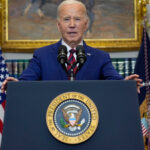
Published September 29, 2022
Last week, the calendar finally marked the start of autumn, and inhabitants of the entire northern hemisphere are likely to be breathing a sigh of relief. Summer is supposed to be hot—but not as hot as these past few months have been for much of the globe.
In early September, California sweltered under temperatures as high as 117˚F, setting new all-time highs and shattering previous September records by several degrees. But the season started hot in some parts of the world as meteorologists worried that the extraordinary combination of heat and humidity engulfing India would test the limits of human survivability in earth’s most densely populated region.
By July, it was Europe’s turn as the continent was baking under historic heat and drought. Wildfires engulfed parts of Portugal, Spain, and France, while in the U.K., no less than 34 reporting stations surpassed the U.K.’s previous national heat record—this in a country that has been measuring and reporting weather conditions longer than any other on earth. In the ensuing weeks, rivers and lakes dried up across Europe, a crisis topped only by the unprecedented heat and drought affecting China in August.
The 104˚F temperatures that baked London in mid-July were enough to prompt the first ever code red heat warning for the country, as officials warned of “widespread impacts on people and infrastructure.” Residents of San Antonio or Phoenix might roll their eyes, but the warnings were borne out by events. Not only were health services pressured by elderly patients struggling to cope in a country where air conditioning is rare, but airports closed as asphalt runways melted and buckled, data centers shut down as cooling systems were overwhelmed, and wildfires engulfed parts of East London in scenes more reminiscent of California than of England’s “green and pleasant land.” These effects remind us that when it comes to heat, it’s all about what you’re used to—which is both good news and bad news in a steadily warming world.
On the one hand, human beings are clearly capable of coping with far higher heat and humidity than what Britain endured this July, even without air conditioning. Many inhabitants of tropical regions do so on a daily basis, and indeed, India’s supposedly life-threatening heatwave back in May turned out to be less dangerous than predicted. Moreover, we have the ingenuity and know-how to mix asphalt that will not melt in 100˚F heat; otherwise, no one would be able to drive for months on end in Arizona.
The climate change optimist might well look at this year’s 104˚F in the U.K. and last year’s 121˚F in southwest Canada and simply see an investment opportunity: time to start installing air conditioning and redesigning airport runways throughout the far northern hemisphere.
After all, God designed human beings to be the most adaptable species on earth. Even before the advent of modern technology, our ancestors could be found snuggling up in igloos in Labrador, or traversing thousands of miles of the Sahara Desert. Today, we can survive in the middle of Antarctica or even outer space. Whatever changes befall the climate, the truth is that most of us will find a way to weather them. If China’s power grid buckles under the strain of a historic heatwave, perhaps that just means the Chinese need to innovate so they can prepare better for the next one.
At the same time, the knock-on effects of recent heatwaves, from uncontrollable wildfires to diminishing reservoirs to overheated data centers, remind us that adapting to a hotter world isn’t simply a matter of adding more shorts and tank tops to your high-latitude wardrobe. In many cases, our current infrastructure and living habits reflects centuries of building around the expectation that “it never gets that hot here,” expectations likely to be repeatedly challenged in the years ahead.
Adapting to a warmer world will require significant forethought, innovation, and investment, perhaps challenging the hypothesis that it would be cheaper to adjust to climate change than to reverse it. Moreover, it is crucial to remember that while wealthier countries can generally afford to invest in the necessary changes, poorer countries cannot always do so.
Once again, both climate optimists and climate pessimists have important points to make. Yes, given time and ingenuity, we should be able to adjust to life in a warmer world. But no, it will not be easy, and no one should argue otherwise.
Brad Littlejohn, Ph.D., is a Fellow in EPPC’s Evangelicals in Civic Life Program, where his work focuses on helping public leaders understand the intellectual and historical foundations of our current breakdown of public trust, social cohesion, and sound governance. His research investigates shifting understandings of the nature of freedom and authority, and how a more full-orbed conception of freedom, rooted in the Christian tradition, can inform policy that respects both the dignity of the individual and the urgency of the common good. He also serves as President of the Davenant Institute.
Photo by Meiying Ng on Unsplash
Brad Littlejohn, Ph.D., is a Fellow in EPPC’s Evangelicals in Civic Life Program, where his work focuses on helping public leaders understand the intellectual and historical foundations of our current breakdown of public trust, social cohesion, and sound governance. His research investigates shifting understandings of the nature of freedom and authority, and how a more full-orbed conception of freedom, rooted in the Christian tradition, can inform policy that respects both the dignity of the individual and the urgency of the common good. He also serves as President of the Davenant Institute.










